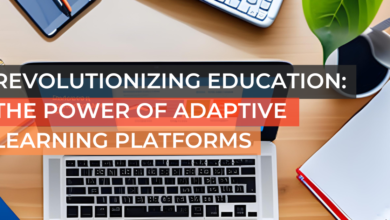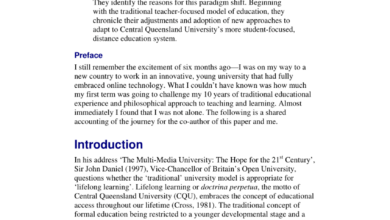Online Courses: Revolutionizing Education
Contents
- 1 Hello Readers,
- 2 Introduction
- 3 Strengths of Online Courses
- 3.1 Flexibility and Convenience
- 3.2 Affordability
- 3.3 Accessibility
- 3.4 Self-Paced Learning
- 3.5 Global Reach
- 3.6 Weaknesses of Online Courses
- 3.7 Lack of Personal Interaction
- 3.8 Technical Issues
- 3.9 Self-Motivation
- 3.10 Limited Hands-On Experience
- 3.11 Assessment Challenges
- 3.12 Table: Overview of Online Courses
- 4 FAQs about Online Courses
- 4.1 What types of online courses are available?
- 4.2 How do I choose the right online course for me?
- 4.3 What are the benefits of taking online courses?
- 4.4 What are the challenges of taking online courses?
- 4.5 How can I succeed in online courses?
- 4.6 Are online courses as good as traditional face-to-face courses?
- 4.7 What is the future of online learning?
- 5 Conclusion
- 6 Call to Action
- 7 Closing Words
Hello Readers,
Welcome to our comprehensive exploration of online courses, a transformative educational paradigm shaping the future of learning. In this article, we delve into the intricacies of these virtual learning platforms, examining their strengths, weaknesses, and vast potential for expanding access to knowledge and empowering lifelong learning.
The advent of online courses has irrevocably altered the traditional educational landscape, offering unparalleled flexibility, affordability, and convenience. As technology continues to advance, online learning platforms are becoming increasingly sophisticated, providing interactive learning experiences that rival those of brick-and-mortar institutions.
However, it is crucial to note that online courses also come with their own unique set of challenges, which we will explore in detail. By understanding both the advantages and limitations of this educational approach, learners can make informed decisions about whether online courses are the right fit for their learning goals.
Introduction
Online courses, also known as e-learning or distance learning, have emerged as a powerful tool for delivering education beyond the confines of traditional classrooms. These courses utilize various technologies, such as video lectures, interactive simulations, and online discussion forums, to provide learners with a flexible and accessible learning environment.
The proliferation of online courses has been driven by a confluence of factors, including the rapid advancement of technology, the growing demand for lifelong learning opportunities, and the need to address the challenges of traditional educational models.
In this section, we will provide a comprehensive overview of online courses, discussing their history, evolution, and the various types of online learning platforms available. We will also explore the benefits and challenges associated with online education, empowering learners to make informed decisions about whether this educational approach aligns with their learning needs and goals.
Strengths of Online Courses
Flexibility and Convenience
One of the primary strengths of online courses is their unrivaled flexibility. Learners can access course materials and complete assignments at their own pace and on their own schedule, allowing them to balance their education with work, family, and other commitments.
The asynchronous nature of online learning eliminates the need for physical attendance, enabling learners to participate in discussions and complete assignments from anywhere with an internet connection.
Affordability
Online courses are typically more affordable than traditional face-to-face courses. This is due to the reduced overhead costs associated with online education, such as the elimination of classroom rental and transportation expenses.
Additionally, many online courses offer flexible payment plans and financial aid options, making them accessible to a broader range of learners.
Accessibility
Online courses have significantly expanded access to education for individuals who may not have the opportunity to attend traditional institutions. This includes learners in remote areas, those with disabilities, or those who are unable to participate in on-campus classes due to work or family obligations.
Online learning platforms provide a virtual environment that is accessible to all, regardless of location or circumstances.
Self-Paced Learning
Online courses often allow learners to progress at their own pace. This is particularly beneficial for learners who need more time to grasp concepts or those who have prior knowledge that allows them to advance more quickly.
Self-paced learning empowers learners to customize their learning experience and achieve their educational goals at their own unique speed.
Global Reach
Online courses transcend geographical boundaries, connecting learners from all corners of the globe. This enables learners to access courses and interact with peers from diverse cultural backgrounds, fostering intercultural understanding and collaboration.
The global reach of online courses promotes diversity and inclusivity in education.
Weaknesses of Online Courses
Lack of Personal Interaction
One of the potential drawbacks of online courses is the lack of face-to-face interaction with instructors and classmates. This can make it challenging for learners to build relationships, ask questions in real time, and receive personalized feedback.
Online courses may also lack the social and collaborative elements that are often found in traditional classroom settings.
Technical Issues
Online courses rely heavily on technology, which can sometimes lead to technical issues. These issues can range from minor inconveniences, such as slow loading times, to more serious problems, such as data loss or platform outages.
Technical difficulties can be frustrating for learners and can disrupt the learning process.
Self-Motivation
Online courses require a high level of self-motivation and discipline. Learners must be able to manage their time effectively, stay organized, and complete assignments without the external structure of a traditional classroom environment.
For some learners, the lack of structure and accountability can make it challenging to stay engaged and motivated.
Limited Hands-On Experience
Online courses may not be suitable for subjects that require hands-on experience or practical skills. This is particularly true for courses in fields such as science, engineering, and the arts.
Lack of hands-on experience can limit the depth of learning and the development of practical skills.
Assessment Challenges
Assessing learner progress in online courses can be challenging. Traditional methods of assessment, such as written exams and in-person presentations, may not be effective in an online environment.
Online courses require innovative assessment strategies that ensure the integrity and validity of learner evaluations.
Table: Overview of Online Courses
| Feature | Description |
|—|—|
| Flexibility | Learners can access course materials and complete assignments at their own pace and schedule |
| Affordability | Online courses are typically more affordable than traditional face-to-face courses |
| Accessibility | Online courses are accessible to learners in remote areas, those with disabilities, and those with busy schedules |
| Self-Paced Learning | Learners can progress through the course at their own pace |
| Global Reach | Online courses connect learners from all over the world |
| Lack of Personal Interaction | Online courses may lack the personal interaction found in traditional classroom settings |
| Technical Issues | Online courses rely on technology, which can sometimes lead to technical problems |
| Self-Motivation | Online courses require learners to be self-motivated and disciplined |
| Limited Hands-On Experience | Online courses may not be suitable for subjects that require hands-on experience |
| Assessment Challenges | Assessing learner progress in online courses can be challenging |
FAQs about Online Courses
What types of online courses are available?
There are many different types of online courses available, including MOOCs (Massive Open Online Courses), self-paced courses, instructor-led courses, and hybrid courses that combine online and face-to-face learning.
How do I choose the right online course for me?
When choosing an online course, consider your learning goals, learning style, and schedule. Research different platforms and course providers to find one that meets your specific needs.
What are the benefits of taking online courses?
Online courses offer many benefits, including flexibility, affordability, accessibility, self-paced learning, and global reach.
What are the challenges of taking online courses?
Online courses can be challenging due to lack of personal interaction, technical issues, self-motivation, limited hands-on experience, and assessment challenges.
How can I succeed in online courses?
To succeed in online courses, it is important to be self-motivated, organized, and disciplined. Create a dedicated study space, set goals, and stay on track.
Are online courses as good as traditional face-to-face courses?
The quality of online courses varies depending on the platform and course provider. Some online courses are comparable to traditional face-to-face courses, while others may not be as effective.
What is the future of online learning?
The future of online learning is bright. As technology continues to advance, online courses will become more interactive, personalized, and accessible, reaching an even wider audience of learners.
Conclusion
Online courses have revolutionized the educational landscape, offering unprecedented opportunities for lifelong learning and professional development. However, it is important to understand both the strengths and weaknesses of online education to make informed decisions about whether this educational approach is right for you.
By carefully considering the factors discussed in this article, learners can harness the power of online courses to achieve their educational goals while mitigating potential challenges.
The future of online learning holds immense promise. As technology continues to advance, we can expect to see even more innovative and engaging online courses that provide learners with transformative and empowering educational experiences.
Call to Action
If you are considering taking an online course, we encourage you to do your research and find a platform and course provider that meets your specific needs. With careful planning and dedication, you can unlock the many benefits of online learning and take your education to the next level.
Embrace the online learning revolution and embark on a journey of lifelong learning and personal growth. The world of knowledge is at your fingertips. Seize the opportunity to learn, grow, and achieve your dreams.
Closing Words
Thank you for taking the time to read our comprehensive guide to online courses. We hope that this article has provided you with valuable insights and information to make informed decisions about your educational journey.









